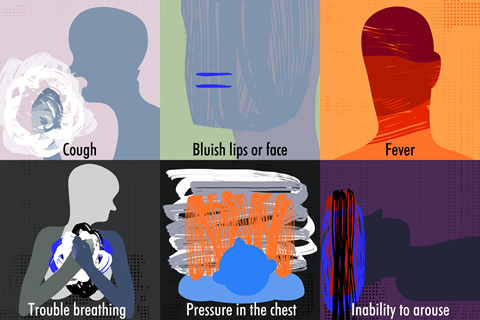Blog
Covid-19 and Diarrhea
WHAT IS COVID-19?
COVID-19 is a disease that is destroying the human respiratory system. It is caused by the SARS-COV virus and has origins in China. Patients experiencing a confirmed diagnosis of COVID-19 experience a broad range of symptoms closely associated with respiratory distress. However, in a minority of patients, they are also experiencing diarrhea and gastrointestinal upset. Diarrhea can occur independent of an underlying health condition and the causes can vary.
What medical experts are noticing in COVID-19 patients is a set of commonly displayed biomarkers that cross-section with some common GI conditions. As the virus escalations continue, more information is becoming available. Unfortunately, there remains many unknowns about the exact symptomology pertaining to COVID-19. What we do know is that the pandemic has stretched the globe and has many subsets of symptoms that are lesser known – one of which is diarrhea.
U.S. Based Medical Expert Quote on COVID-19
"We are only now learning the varied spectrum of symptoms for patients who present with COVID-19," said Dr. Robert Glatter, an emergency medicine physician at Lenox Hill Hospital in New York City.”
WHAT ARE SOME OF THE MOST COMMON COVID-19 SYMPTOMS?
These symptoms are said to appear within 2-14 days following transmission.
- Fever
- Dry Cough (Intersects with GI related condition)
- Shortness of Breath
- Fatigue
- Loss of Taste or Smell
- Body & Muscle Aches
- Diarrhea (Intersects with GI related condition)
- Sore Throat (Intersects with GI related condition)
- Congestion
- Headache

Emergency Warning Signs for COVID-19: If any of these symptoms arise, seek emergency medical attention. [1]
- Bluish Lips
- Inability to Breathe or Speak
- Pain or Pressure in Chest
- Confusion
- High Persistent Fever
- Inability or Trouble Remaining Conscious
HOW IS COVID-19 SPREAD?
Coronavirus is spread in two distinct ways:
- Contact with an infected individual or contaminated surface.
- Hanging droplets suspended in the air that occurs via sneezing and coughing.
*The CDC has outlined specific guidelines over the past few weeks to help keep minimize the risk for exposure.
- Avoid crowded locations
- Frequent handwashing is advised
- Avoid touching your face and eyes
- Clean and disinfect surfaces and items around your home and office
IS DIARRHEA CONSIDERED A SYMPTOM OF COVID-19?
Yes. Diarrhea and other areas of gastrointestinal upset are considered signs and presentations of coronavirus. If you are unsure as to the cause of your persistent diarrhea, you are encouraged to seek medical care for proper testing and an accurate diagnosis.
WHAT IF I HAVE IBD-RELATED DIARRHEA, AM I MORE AT RISK FOR COVID-19?
Yes. Medical experts are seeing some correlation between COVID-19 and IBD. An analysis of COVID-19 patients showed a subpopulation of people with mild respiratory symptoms, but instead presented with mild gastrointestinal issues. About 20% of the people studied experienced diarrhea as part of their first symptom presentation. [2]
It is not conclusive the exact relationship between the coronavirus and IBD, we just know each influence and the exacerbates the other. One study indicated a vast percentage ranging from 3 –79% of people experience GI related issues. Some patients have diarrhea present without fever as well. [3] The findings of concurrent clinical studies are getting updated every day, so the learning curve for coronavirus is still climbing. As a result, there are still many unanswered questions regarding COVID-19 and IBD-related diarrhea.
WHAT DO MEDICAL EXPERTS KNOW ABOUT THE LINK BETWEEN COVID-19 AND GI CONDITIONS?
What we do know is there have been positive COVID-19 stool samples and they are possibly using this biomarker as a firm indicator against false-positive tests. [2] Because of the study results, experts also advise using diarrhea as evidence of possible COVID-19 transmission. [5]
This is especially true for those who aren’t showing noticeable respiratory distress. Research has indicated that a lesser known transmission route is possible via the digestive system. The virus is said to enter via surface receptors known as ACE2 that are in heavy circulation within the GI tract. [3,4]
HOW IS COVID-19 RELATED DIARRHEA TREATED?
Confirming the presence of the coronavirus or isolating the exact cause is the first step to getting treatment. Gastroenterologists will provide the necessary tests and then also strategize to keep you as healthy as possible. [3,4]
Some of the more common treatments include:
- Hydration Efforts - Doctors advise staying hydrated as best as possible using clear liquids such as water, low-sugar electrolyte drinks, and/or clear vegetable broths. IV interventions or infusions may be a part of the treatment plan.
- Anti-Diarrheal OTC Medications – Doctors advise using these at the counsel of your gastroenterologist
- Prescription IBD Drugs - Experts don’t readily recommend discontinuing prescription anti-inflammatory drugs used for IBD. To better assist our medical community with COVID-19 and IBD related diarrhea episodes, the Internal Organization for Inflammatory Disease as ongoing resource.

SCHEDULING AN APPOINTMENT TO SEE YOUR GASTROENTEROLOGIST
In order to put to rest any suspicions as to the exact cause of your diarrhea, it is recommended to schedule an appointment right away. Each one of Saratoga-Schenectady Gastroenterology Offices is considered an essential business. We are following all the CDC-recommended safe practices to keep exposure to a minimum. Therefore, we have a variety of courtesy-related services to streamline the process such as video appointments and telemedicine. We are in this together and your wellness is our top priority. [1]
REFERENCES:
1. https://www.cdc.gov/coronavirus/2019-ncov/symptoms-testing/symptoms.html
2. https://www.discovermagazine.com/health/wondering-if-you-have-covid-19-diarrhea-may-be-a-symptom
3. https://www.healthline.com/health/coronavirus-diarrhea#gastrointestinal-symptoms